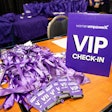The expertise, responsiveness, and thoroughness of service providers will impact your meeting. The poor ones live in infamy as you retell the story of how you scrambled and served eggs because the cook forgot to wake up (true story). We remember the excellent ones for how they made our jobs much easier, especially under stress.
Our sleepy cook did not get a tip (clearly), but those who partner with planners should be thanked, and tipping is the industry standard—even for small meetings. It’s never wrong to show our gratitude. It helps support low-wage workers, builds a relationship with the hotel for repeat business, and it is proof of your gratitude for a job well done. Also, it’s customary in the U.S.
However, not all planners have been taught why and how to tip, so they either don’t know that they should tip or refrain because they don’t know how to tip. You can become a confident meeting tipper by planning ahead.
Establish your tipping procedures in advance to avoid last-minute rushing. Prepare to tip each service provider, but distribute only to those who earned one for good service, and especially for exceptional service. Customary and poor services do not need to be tipped.
In advance
- Plan for them. Include tips in your meeting budget. Plan for 1.5–2.5 percent of overall spend or flat amount per attendee/day. Even with a lean budget you should include something for the providers who are Very Important level. (See table.)
- Get the cash. For small tips to bellmen and housekeeping, stock your wallet with $1 and $5 bills. For the others, determine how you will access the cash in the correct denominations. A simple, safe method is to get a “paid out” from the master bill from the hotel. Request it a few weeks in advance so they will have it on hand when you’re ready to distribute it; it is unlikely they will have enough on hand.
- Note cards are a nice touch. Pack organization-branded note cards and envelopes to use for distributing tips with customized thank you messages.
- Learn how the venue handles service charges and gratuity. Each venue interprets this differently. The key is to ask your hotel point person how the income is distributed. If staff gets nothing, ask if their hourly flat rate is higher because of that and adjust your tips accordingly. Service charges are taxable in many states; ask about that, too.
- Track the money. For accountability, create a simple tip distribution form to prove that the tips were received by the intended recipients. File the form with your permanent financial records for the meeting. This can feel awkward but is a safeguard worth implementing.:
On-site
- Get names. Tell your convention services manager that you will be distributing envelopes (code for tips) and that you will need the first and last names of service providers. Also alert him/her that will you need a list of the shifts each worked so you know who was doing what during peak times.
- You’ll never remember all the service providers who assisted you, so maintain an ongoing list of names, positions, and what they did to refer to when you’re filling envelopes and writing notes.
- Gift cards are good, too. If you are unable to give cash, give universally usable gift cards such as Amazon.
- Do something. If you are unable to give tips of any kind, personally give hand-written, personalized notes.
- They can’t accept. If your venue does not allow staff to accept tips, consider giving a staff pizza party on a date they choose.
[inlinead align="left"]
[inlinead align="left"]
















